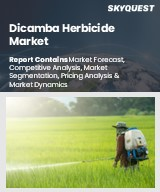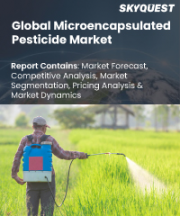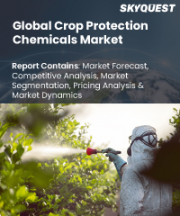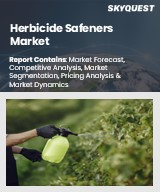
|
시장보고서
상품코드
1576616
플루오메트론 시장 : 제품 유형, 용도, 최종 사용자, 판매 채널별 예측(2025-2030년)Fluometuron Market by Product Type (Mixed Fluenturon, Pure Fluenturon), Application (Chemical Manufacturing, Herbicides, Pesticides), End User, Sales Channel - Global Forecast 2025-2030 |
||||||
플루오메트론 시장은 2023년에 2억 1,364만 달러로 평가되었고, 2024년에는 2억 2,464만 달러에 도달할 것으로 예측되며, CAGR 5.04%로 성장해 2030년에는 3억 156만 달러에 이를 것으로 예측됩니다.
플루오메트론은 선택적 제초제이며, 주로 농업, 특히 면작물의 관리에 사용되며, 활엽 잡초와 초본 잡초를 방제합니다. 그 범위와 정의는 요소 기반 제초제로서의 기능을 포함하며, 대상 식물 종의 광합성을 억제하여 작물을 보호하도록 설계되었습니다. 플루오메트론의 필요성은 잡초와의 경쟁을 최소한으로 억제하는 것으로 작물의 수율을 향상시키는 효과에 있어, 잡초의 만연이 많은 지역이나 대규모 면화 재배에는 빠뜨릴 수 없습니다. 그 용도는 면화 이외에도 퍼지고 있지만, 면화가 주류인 것에 변함이 없으며, 규제 당국의 승인에 따라서는 다양한 마이너 작물에도 사용할 가능성이 있습니다. 최종 용도는 수율 최적화를 선호하는 상업 농장과 농업 협동 조합에 집중되어 있습니다.
| 주요 시장 통계 | |
|---|---|
| 기준년(2023) | 2억 1,364만 달러 |
| 예측년(2024) | 2억 2,464만 달러 |
| 예측년(2030) | 3억 156만 달러 |
| CAGR(%) | 5.04% |
시장 성장 촉진요인으로는 세계 면화 수요 증가와 농업 관행의 확대가 있습니다. 또한, 제초제 제제의 기술적 진보와 종합적 해충 관리 방법의 채용이 플루오메트론의 적응을 강화하고 있습니다. 아시아태평양과 아프리카 등 농업의 확대와 현대화가 진행되고 있는 지역에는 급성장의 기회가 있습니다. 기업은 제형 개선을 위한 조사와 미개척 시장으로의 유통망 확대에 투자함으로써 이러한 기회를 활용할 것을 권장합니다. 또한 지속 가능한 농업을 추진하기 위해 농업 단체와의 파트너십은 시장에서의 포지셔닝을 향상시킬 수 있습니다.
반대로 시장의 성장은 환경과 건강에 대한 우려로 인한 규제의 한계라는 과제에 직면하고 있습니다. 유기농법과 대체 잡초방제법의 추진은 잠재적인 제약을 가져옵니다. 또한 잡초의 유형에 따라 내성이 생기면 효력이 저하되기 때문에 기술 혁신이 필요합니다. 기업은 이러한 한계에 대응하기 위해 내성 관리 솔루션의 개발과 생분해성 또는 환경 친화적인 제형 탐구에 주력해야 합니다.
제초제의 사용을 최적화하는 조합 제품과 정밀 농업 기술의 개발에는 기술 혁신의 기회가 가득합니다. 무인 항공기 기술과 같은 대안적인 살포 방법의 조사는 비즈니스 성장의 길을 제공할 수 있습니다. 이러한 역학을 이해하는 것은 시장 역학의 진화를 효과적으로 이용하는 것을 목표로하는 이해 관계자에게 매우 중요합니다.
시장 역학: 빠르게 진화하는 플루오메트론 시장의 주요 시장 인사이트 공개
플루오메트론 시장은 수요 및 공급의 역동적인 상호작용에 의해 변모하고 있습니다. 이러한 시장 역학의 진화를 이해함으로써 기업은 충분한 정보를 바탕으로 투자결정, 전략적 결정 정밀화, 새로운 비즈니스 기회 획득에 대비할 수 있습니다. 이러한 동향을 종합적으로 파악함으로써 기업은 정치적, 지리적, 기술적, 사회적, 경제적 영역에 걸친 다양한 위험을 완화할 수 있으며, 소비자 행동과 그것이 제조 비용과 구매 동향에 미치는 영향을보다 명확하게 이해할 수 있습니다.
- 시장 성장 촉진요인
- 면화 생산 수요 증가와 섬유 산업에서의 광범위한 이용
- 현대적이고 효율적인 농법의 채용, 정밀 농업과 농학 기술의 혁신
- 제제의 개량과 환경안전기준의 준수
- 시장 성장 억제요인
- 환경 부하가 낮은 대체 제초제의 존재
- 제조에 필요한 플루오메트론 원재료 가격의 변동
- 시장 기회
- 정밀농업기술에 있어서의 플루오메트론의 활용에 의한 제초제 살포량의 최적화
- 플루오메트론의 환경 친화적인 제형을 개발하여 생태계에 미치는 영향을 줄입니다.
- 성장률이 높은 신흥 농업 시장에서 플루오메트론 시장 가능성 평가
- 시장의 과제
- 환경과 건강에 대한 우려
Porter's Five Forces: 플루오메트론 시장을 탐색하는 전략 도구
Porter's Five Forces 프레임 워크는 시장 상황경쟁 구도를 이해하는 중요한 도구입니다. Porter's Five Force Framework는 기업의 경쟁력을 평가하고 전략적 기회를 탐구하는 명확한 기술을 제공합니다. 이 프레임워크는 기업이 시장 내 세력도를 평가하고 신규 사업의 수익성을 결정하는 데 도움이 됩니다. 이러한 통찰을 통해 기업은 자사의 강점을 활용하고, 약점을 해결하고, 잠재적인 과제를 피할 수 있으며, 보다 강인한 시장에서의 포지셔닝을 보장할 수 있습니다.
PESTLE 분석 : 플루오메트론 시장에서 외부로부터의 영향 파악
외부 거시 환경 요인은 플루오메트론 시장의 성과 역학을 형성하는데 매우 중요한 역할을 합니다. 정치적, 경제적, 사회적, 기술적, 법적, 환경적 요인 분석은 이러한 영향을 탐색하는 데 필요한 정보를 제공합니다. PESTLE 요인을 조사함으로써 기업은 잠재적인 위험과 기회를 더 잘 이해할 수 있습니다. 이 분석을 통해 기업은 규제, 소비자 선호, 경제 동향의 변화를 예측하고 앞으로 예상되는 적극적인 의사 결정을 할 준비를 할 수 있습니다.
시장 점유율 분석 : 플루오메트론 시장 경쟁 구도 파악
플루오메트론 시장의 상세한 시장 점유율 분석을 통해 공급업체의 성과를 종합적으로 평가할 수 있습니다. 기업은 수익, 고객 기반, 성장률 등 주요 지표를 비교하여 경쟁 포지셔닝을 밝힐 수 있습니다. 이 분석을 통해 시장 집중, 단편화, 통합 동향을 밝혀내고 벤더들은 경쟁이 치열해지는 가운데 자사의 지위를 높이는 전략적 의사 결정을 내리는 데 필요한 지식을 얻을 수 있습니다.
FPNV 포지셔닝 매트릭스 : 플루오메트론 시장에서 공급업체의 성능 평가
FPNV 포지셔닝 매트릭스는 플루오메트론 시장에서 공급업체를 평가하는 중요한 도구입니다. 이 행렬을 통해 비즈니스 조직은 공급업체의 비즈니스 전략과 제품 만족도를 기준으로 평가하여 목표에 맞는 충분한 정보를 바탕으로 의사 결정을 내릴 수 있습니다. 네 가지 사분면을 통해 공급업체를 명확하고 정확하게 세분화하여 전략 목표에 가장 적합한 파트너 및 솔루션을 파악할 수 있습니다.
전략 분석 및 추천 : 플루오메트론 시장에서 성공을 위한 길을 그리기
플루오메트론 시장의 전략 분석은 세계 시장에서의 존재를 강화하려는 기업에 필수적입니다. 주요 자원, 능력 및 성과 지표를 검토함으로써 기업은 성장 기회를 파악하고 개선을 위해 노력할 수 있습니다. 이러한 접근 방식을 통해 경쟁 구도에서 과제를 극복하고 새로운 비즈니스 기회를 활용하여 장기적인 성공을 거둘 수 있는 체제를 구축할 수 있습니다.
이 보고서는 주요 관심 분야를 포괄하는 시장의 종합적인 분석을 제공합니다.
1. 시장 침투: 현재 시장 환경의 상세한 검토, 주요 기업의 광범위한 데이터, 시장 도달범위 및 전반적인 영향력 평가.
2. 시장 개척도: 신흥 시장의 성장 기회를 파악하고 기존 분야의 확장 가능성을 평가하며 미래 성장을 위한 전략적 로드맵을 제공합니다.
3. 시장 다양화: 최근 제품 출시, 미개척 지역, 업계의 주요 진보, 시장을 형성하는 전략적 투자를 분석합니다.
4. 경쟁 평가 및 정보 : 경쟁 구도를 철저히 분석하여 시장 점유율, 사업 전략, 제품 포트폴리오, 인증, 규제 당국 승인, 특허 동향, 주요 기업의 기술 진보 등을 검증합니다.
5. 제품 개발 및 혁신 : 미래 시장 성장을 가속할 것으로 예상되는 최첨단 기술, R&D 활동, 제품 혁신을 강조합니다.
또한 이해관계자가 충분한 정보를 얻고 의사결정을 할 수 있도록 중요한 질문에 대답하고 있습니다.
1. 현재 시장 규모와 향후 성장 예측은?
2. 최고의 투자 기회를 제공하는 제품, 부문 및 지역은 어디입니까?
3. 시장을 형성하는 주요 기술 동향과 규제의 영향은?
4. 주요 벤더의 시장 점유율과 경쟁 포지션은?
5. 벤더 시장 진입·철수 전략의 원동력이 되는 수익원과 전략적 기회는 무엇인가?
목차
제1장 서문
제2장 조사 방법
제3장 주요 요약
제4장 시장 개요
제5장 시장 인사이트
- 시장 역학
- 성장 촉진요인
- 면화 생산 수요 증가와 섬유 산업에 있어서의 광범위한 사용
- 현대적이고 효율적인 농업 관행과 정밀 농업 및 농업 기술의 혁신 채택
- 처방 개선과 환경안전기준 준수
- 억제요인
- 환경에 대한 영향이 적은 대체 제초제의 존재
- 제조에 필요한 플루오메트론 원재료의 가격 변동
- 기회
- 정밀농업기술의 플루오메트론을 활용하여 제초제 살포율을 최적화한다
- 생태학적 영향을 경감하는 플루오메트론의 환경 친화적인 처방의 개발
- 성장률이 높은 신흥 농업 시장에서 플루오메트론 시장 잠재력 평가
- 과제
- 환경과 건강에 대한 우려
- 성장 촉진요인
- 시장 세분화 분석
- Porter's Five Forces 분석
- PESTEL 분석
- 정치적
- 경제
- 사교
- 기술적
- 법률상
- 환경
제6장 플루오메트론 시장 : 제품 유형별
- 혼합 플루엔투론
- 순수 플루엔투론
- 액체 형태
- 고체 형태
제7장 플루오메트론 시장 : 용도별
- 화학제조
- 제초제
- 농업용 제초제
- 원예용 제초제
- 농약
제8장 플루오메트론 시장 : 최종 사용자별
- 농업과 임업
- 화학산업
- 원예
- 연구기관
제9장 플루오메트론 시장 : 판매 채널별
- 직접 판매
- 리셀러
- 온라인 판매
제10장 아메리카의 플루오메트론 시장
- 아르헨티나
- 브라질
- 캐나다
- 멕시코
- 미국
제11장 아시아태평양의 플루오메트론 시장
- 호주
- 중국
- 인도
- 인도네시아
- 일본
- 말레이시아
- 필리핀
- 싱가포르
- 한국
- 대만
- 태국
- 베트남
제12장 유럽·중동 및 아프리카의 플루오메트론 시장
- 덴마크
- 이집트
- 핀란드
- 프랑스
- 독일
- 이스라엘
- 이탈리아
- 네덜란드
- 나이지리아
- 노르웨이
- 폴란드
- 카타르
- 러시아
- 사우디아라비아
- 남아프리카
- 스페인
- 스웨덴
- 스위스
- 터키
- 아랍에미리트(UAE)
- 영국
제13장 경쟁 구도
- 시장 점유율 분석 2023
- FPNV 포지셔닝 매트릭스, 2023
- 경쟁 시나리오 분석
- 전략 분석과 제안
The Fluometuron Market was valued at USD 213.64 million in 2023, expected to reach USD 224.64 million in 2024, and is projected to grow at a CAGR of 5.04%, to USD 301.56 million by 2030.
Fluometuron is a selective herbicide primarily used in agriculture, especially for cotton crop management, to control broadleaf and grassy weeds. Its scope and definition encompass its function as a urea-based herbicide, designed to inhibit photosynthesis in targeted plant species, thereby protecting crops. The necessity of Fluometuron arises from its effectiveness in enhancing crop yield by minimizing weed competition, making it vital in regions with high weed infestation and large-scale cotton cultivation. The application extends beyond cotton, although it remains predominant there, with potential use in various minor crops contingent on regulatory approvals. The end-use is concentrated among commercial farms and agricultural cooperatives prioritizing yield optimization.
| KEY MARKET STATISTICS | |
|---|---|
| Base Year [2023] | USD 213.64 million |
| Estimated Year [2024] | USD 224.64 million |
| Forecast Year [2030] | USD 301.56 million |
| CAGR (%) | 5.04% |
Market insights reveal that increasing global cotton demand and expanding agricultural practices are key growth drivers. Furthermore, technological advancements in herbicide formulations and the adoption of integrated pest management practices bolster Fluometuron's adaptation. There are burgeoning opportunities in regions such as Asia-Pacific and Africa, where agricultural expansion and modernization are underway. Companies are advised to leverage these opportunities by investing in research for formulation improvement and expanding distribution networks to untapped markets. Additionally, partnerships with agricultural organizations to promote sustainable practices can enhance market positioning.
Conversely, market growth faces challenges from regulatory restrictions due to environmental and health concerns. The push for organic farming and alternative weed control methods poses potential limitations. Moreover, resistance developed by weed species reduces efficacy, necessitating innovation. Companies should focus on developing resistant management solutions and exploring biodegradable or eco-friendly formulations to counteract these limitations.
Innovation opportunities abound in the development of combination products and precision agriculture technologies that optimize herbicide use. Research into alternative application methods, such as drone technology, can offer business growth avenues. Understanding these dynamics is crucial for stakeholders aiming to navigate effectively and capitalize on the evolving nature of the Fluometuron market.
Market Dynamics: Unveiling Key Market Insights in the Rapidly Evolving Fluometuron Market
The Fluometuron Market is undergoing transformative changes driven by a dynamic interplay of supply and demand factors. Understanding these evolving market dynamics prepares business organizations to make informed investment decisions, refine strategic decisions, and seize new opportunities. By gaining a comprehensive view of these trends, business organizations can mitigate various risks across political, geographic, technical, social, and economic domains while also gaining a clearer understanding of consumer behavior and its impact on manufacturing costs and purchasing trends.
- Market Drivers
- Increasing demand for cotton production and extensive use in the textile industry
- Adoption of modern and efficient agricultural practices and innovations in precision farming and agronomic techniques
- Formulation improvements and compliance with environmental safety norms
- Market Restraints
- Presence of alternative herbicides with lower environmental impact
- Fluctuating prices of raw materials required for manufacturing fluometuron
- Market Opportunities
- Leveraging fluometuron in precision farming technologies to optimize herbicide application rates
- Developing environmentally friendly formulations of fluometuron for reduced ecological impact
- Assessing market potential for fluometuron in emerging agricultural markets with high growth rates
- Market Challenges
- Environmental and health concern
Porter's Five Forces: A Strategic Tool for Navigating the Fluometuron Market
Porter's five forces framework is a critical tool for understanding the competitive landscape of the Fluometuron Market. It offers business organizations with a clear methodology for evaluating their competitive positioning and exploring strategic opportunities. This framework helps businesses assess the power dynamics within the market and determine the profitability of new ventures. With these insights, business organizations can leverage their strengths, address weaknesses, and avoid potential challenges, ensuring a more resilient market positioning.
PESTLE Analysis: Navigating External Influences in the Fluometuron Market
External macro-environmental factors play a pivotal role in shaping the performance dynamics of the Fluometuron Market. Political, Economic, Social, Technological, Legal, and Environmental factors analysis provides the necessary information to navigate these influences. By examining PESTLE factors, businesses can better understand potential risks and opportunities. This analysis enables business organizations to anticipate changes in regulations, consumer preferences, and economic trends, ensuring they are prepared to make proactive, forward-thinking decisions.
Market Share Analysis: Understanding the Competitive Landscape in the Fluometuron Market
A detailed market share analysis in the Fluometuron Market provides a comprehensive assessment of vendors' performance. Companies can identify their competitive positioning by comparing key metrics, including revenue, customer base, and growth rates. This analysis highlights market concentration, fragmentation, and trends in consolidation, offering vendors the insights required to make strategic decisions that enhance their position in an increasingly competitive landscape.
FPNV Positioning Matrix: Evaluating Vendors' Performance in the Fluometuron Market
The Forefront, Pathfinder, Niche, Vital (FPNV) Positioning Matrix is a critical tool for evaluating vendors within the Fluometuron Market. This matrix enables business organizations to make well-informed decisions that align with their goals by assessing vendors based on their business strategy and product satisfaction. The four quadrants provide a clear and precise segmentation of vendors, helping users identify the right partners and solutions that best fit their strategic objectives.
Strategy Analysis & Recommendation: Charting a Path to Success in the Fluometuron Market
A strategic analysis of the Fluometuron Market is essential for businesses looking to strengthen their global market presence. By reviewing key resources, capabilities, and performance indicators, business organizations can identify growth opportunities and work toward improvement. This approach helps businesses navigate challenges in the competitive landscape and ensures they are well-positioned to capitalize on newer opportunities and drive long-term success.
Key Company Profiles
The report delves into recent significant developments in the Fluometuron Market, highlighting leading vendors and their innovative profiles. These include ADAMA Agricultural Solutions, Albaugh LLC, American Vanguard Corporation, Arysta Lifescience, BASF SE, Bayer AG, Corteva Agriscience, FMC Corporation, Gowan Company, Helm AG, Israel Chemicals Ltd., Koch Agronomic Services, Marrone Bio Innovations, Nissan Chemical Corporation, Nufarm Limited, PI Industries, Sumitomo Chemical, Syngenta AG, and UPL Limited.
Market Segmentation & Coverage
This research report categorizes the Fluometuron Market to forecast the revenues and analyze trends in each of the following sub-markets:
- Based on Product Type, market is studied across Mixed Fluenturon and Pure Fluenturon. The Pure Fluenturon is further studied across Liquid Form and Solid Form.
- Based on Application, market is studied across Chemical Manufacturing, Herbicides, and Pesticides. The Herbicides is further studied across Agriculture Herbicides and Horticulture Herbicides.
- Based on End User, market is studied across Agriculture & Forestry, Chemical Industry, Horticulture, and Research Institutions.
- Based on Sales Channel, market is studied across Direct Sales, Distributors, and Online Sales.
- Based on Region, market is studied across Americas, Asia-Pacific, and Europe, Middle East & Africa. The Americas is further studied across Argentina, Brazil, Canada, Mexico, and United States. The United States is further studied across California, Florida, Illinois, New York, Ohio, Pennsylvania, and Texas. The Asia-Pacific is further studied across Australia, China, India, Indonesia, Japan, Malaysia, Philippines, Singapore, South Korea, Taiwan, Thailand, and Vietnam. The Europe, Middle East & Africa is further studied across Denmark, Egypt, Finland, France, Germany, Israel, Italy, Netherlands, Nigeria, Norway, Poland, Qatar, Russia, Saudi Arabia, South Africa, Spain, Sweden, Switzerland, Turkey, United Arab Emirates, and United Kingdom.
The report offers a comprehensive analysis of the market, covering key focus areas:
1. Market Penetration: A detailed review of the current market environment, including extensive data from top industry players, evaluating their market reach and overall influence.
2. Market Development: Identifies growth opportunities in emerging markets and assesses expansion potential in established sectors, providing a strategic roadmap for future growth.
3. Market Diversification: Analyzes recent product launches, untapped geographic regions, major industry advancements, and strategic investments reshaping the market.
4. Competitive Assessment & Intelligence: Provides a thorough analysis of the competitive landscape, examining market share, business strategies, product portfolios, certifications, regulatory approvals, patent trends, and technological advancements of key players.
5. Product Development & Innovation: Highlights cutting-edge technologies, R&D activities, and product innovations expected to drive future market growth.
The report also answers critical questions to aid stakeholders in making informed decisions:
1. What is the current market size, and what is the forecasted growth?
2. Which products, segments, and regions offer the best investment opportunities?
3. What are the key technology trends and regulatory influences shaping the market?
4. How do leading vendors rank in terms of market share and competitive positioning?
5. What revenue sources and strategic opportunities drive vendors' market entry or exit strategies?
Table of Contents
1. Preface
- 1.1. Objectives of the Study
- 1.2. Market Segmentation & Coverage
- 1.3. Years Considered for the Study
- 1.4. Currency & Pricing
- 1.5. Language
- 1.6. Stakeholders
2. Research Methodology
- 2.1. Define: Research Objective
- 2.2. Determine: Research Design
- 2.3. Prepare: Research Instrument
- 2.4. Collect: Data Source
- 2.5. Analyze: Data Interpretation
- 2.6. Formulate: Data Verification
- 2.7. Publish: Research Report
- 2.8. Repeat: Report Update
3. Executive Summary
4. Market Overview
5. Market Insights
- 5.1. Market Dynamics
- 5.1.1. Drivers
- 5.1.1.1. Increasing demand for cotton production and extensive use in the textile industry
- 5.1.1.2. Adoption of modern and efficient agricultural practices and innovations in precision farming and agronomic techniques
- 5.1.1.3. Formulation improvements and compliance with environmental safety norms
- 5.1.2. Restraints
- 5.1.2.1. Presence of alternative herbicides with lower environmental impact
- 5.1.2.2. Fluctuating prices of raw materials required for manufacturing fluometuron
- 5.1.3. Opportunities
- 5.1.3.1. Leveraging fluometuron in precision farming technologies to optimize herbicide application rates
- 5.1.3.2. Developing environmentally friendly formulations of fluometuron for reduced ecological impact
- 5.1.3.3. Assessing market potential for fluometuron in emerging agricultural markets with high growth rates
- 5.1.4. Challenges
- 5.1.4.1. Environmental and health concern
- 5.1.1. Drivers
- 5.2. Market Segmentation Analysis
- 5.3. Porter's Five Forces Analysis
- 5.3.1. Threat of New Entrants
- 5.3.2. Threat of Substitutes
- 5.3.3. Bargaining Power of Customers
- 5.3.4. Bargaining Power of Suppliers
- 5.3.5. Industry Rivalry
- 5.4. PESTLE Analysis
- 5.4.1. Political
- 5.4.2. Economic
- 5.4.3. Social
- 5.4.4. Technological
- 5.4.5. Legal
- 5.4.6. Environmental
6. Fluometuron Market, by Product Type
- 6.1. Introduction
- 6.2. Mixed Fluenturon
- 6.3. Pure Fluenturon
- 6.3.1. Liquid Form
- 6.3.2. Solid Form
7. Fluometuron Market, by Application
- 7.1. Introduction
- 7.2. Chemical Manufacturing
- 7.3. Herbicides
- 7.3.1. Agriculture Herbicides
- 7.3.2. Horticulture Herbicides
- 7.4. Pesticides
8. Fluometuron Market, by End User
- 8.1. Introduction
- 8.2. Agriculture & Forestry
- 8.3. Chemical Industry
- 8.4. Horticulture
- 8.5. Research Institutions
9. Fluometuron Market, by Sales Channel
- 9.1. Introduction
- 9.2. Direct Sales
- 9.3. Distributors
- 9.4. Online Sales
10. Americas Fluometuron Market
- 10.1. Introduction
- 10.2. Argentina
- 10.3. Brazil
- 10.4. Canada
- 10.5. Mexico
- 10.6. United States
11. Asia-Pacific Fluometuron Market
- 11.1. Introduction
- 11.2. Australia
- 11.3. China
- 11.4. India
- 11.5. Indonesia
- 11.6. Japan
- 11.7. Malaysia
- 11.8. Philippines
- 11.9. Singapore
- 11.10. South Korea
- 11.11. Taiwan
- 11.12. Thailand
- 11.13. Vietnam
12. Europe, Middle East & Africa Fluometuron Market
- 12.1. Introduction
- 12.2. Denmark
- 12.3. Egypt
- 12.4. Finland
- 12.5. France
- 12.6. Germany
- 12.7. Israel
- 12.8. Italy
- 12.9. Netherlands
- 12.10. Nigeria
- 12.11. Norway
- 12.12. Poland
- 12.13. Qatar
- 12.14. Russia
- 12.15. Saudi Arabia
- 12.16. South Africa
- 12.17. Spain
- 12.18. Sweden
- 12.19. Switzerland
- 12.20. Turkey
- 12.21. United Arab Emirates
- 12.22. United Kingdom
13. Competitive Landscape
- 13.1. Market Share Analysis, 2023
- 13.2. FPNV Positioning Matrix, 2023
- 13.3. Competitive Scenario Analysis
- 13.4. Strategy Analysis & Recommendation
Companies Mentioned
- 1. ADAMA Agricultural Solutions
- 2. Albaugh LLC
- 3. American Vanguard Corporation
- 4. Arysta Lifescience
- 5. BASF SE
- 6. Bayer AG
- 7. Corteva Agriscience
- 8. FMC Corporation
- 9. Gowan Company
- 10. Helm AG
- 11. Israel Chemicals Ltd.
- 12. Koch Agronomic Services
- 13. Marrone Bio Innovations
- 14. Nissan Chemical Corporation
- 15. Nufarm Limited
- 16. PI Industries
- 17. Sumitomo Chemical
- 18. Syngenta AG
- 19. UPL Limited



















